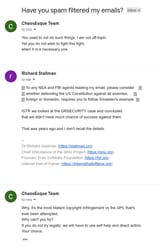Anonymous
ID: HwB4jXYw
8/20/2025, 1:29:15 AM No.513496923
>Where a composer assigned a work in exchange for royalties, he could not sue the assignees for infringement: the Second Circuit suggested that the assignee might be liable in a state court action at common law for breach of an implied obligation not to use the musical theme in a way that would deprive the assignor composer of royalties
>Cortner v. Israel, 732 G.2d 267, 271, 222 U.S.P.Q. 756 (2d Cir. 1984)
RMS and the FSF induced programmers to assign over their copyrights under promises that this was so they could enforce said copyrights. RMS and the FSF have never once brought a case to final decision.
>When a composer assigns a copyright title to a publisher in exchange for the payment of royalties, an equitable trust relationship is established between the two parties which gives the composer the right to sure a non-owner for infingement of the copyright. This relationship is known as "benificial ownership." Allowing the composer or author to sue ensures that the benificial owner is able to protect the work from infringement.
>id at 271
>Batiste v. Island Records Inc., 179 F.3d 217, 220, 51 U.S.P.Q.2d 1107 (5th Cir. 1999)
Programmers assigned over their copyrights to the FSF inorder for the promise, as described to them, of the GPL be fufilled: which was that derivative works be also published openly so that the original authors could benifit from the added labour; exacted upon their work as a derivative work. This is what was explained to them, and all of us.
When we were being fraudulently induced to do labour and create works for Free Software and "Open Source". It was explained in exacting detail:
Labour for Labour.
Code for Code.
FSF and RMS refuse to enforce any of the copyrights at all; and refuse to honour the purpouse of the copyright assignments.
>Cortner v. Israel, 732 G.2d 267, 271, 222 U.S.P.Q. 756 (2d Cir. 1984)
RMS and the FSF induced programmers to assign over their copyrights under promises that this was so they could enforce said copyrights. RMS and the FSF have never once brought a case to final decision.
>When a composer assigns a copyright title to a publisher in exchange for the payment of royalties, an equitable trust relationship is established between the two parties which gives the composer the right to sure a non-owner for infingement of the copyright. This relationship is known as "benificial ownership." Allowing the composer or author to sue ensures that the benificial owner is able to protect the work from infringement.
>id at 271
>Batiste v. Island Records Inc., 179 F.3d 217, 220, 51 U.S.P.Q.2d 1107 (5th Cir. 1999)
Programmers assigned over their copyrights to the FSF inorder for the promise, as described to them, of the GPL be fufilled: which was that derivative works be also published openly so that the original authors could benifit from the added labour; exacted upon their work as a derivative work. This is what was explained to them, and all of us.
When we were being fraudulently induced to do labour and create works for Free Software and "Open Source". It was explained in exacting detail:
Labour for Labour.
Code for Code.
FSF and RMS refuse to enforce any of the copyrights at all; and refuse to honour the purpouse of the copyright assignments.

